初一英语介词用法与练习
- 格式:doc
- 大小:55.00 KB
- 文档页数:22
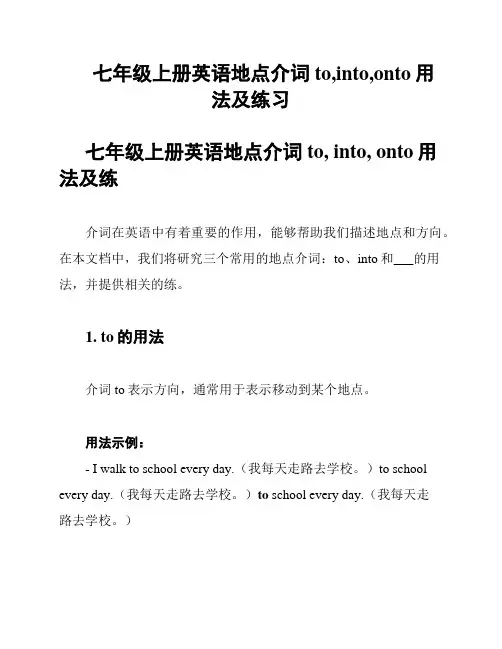
七年级上册英语地点介词to,into,onto用法及练习七年级上册英语地点介词to, into, onto用法及练介词在英语中有着重要的作用,能够帮助我们描述地点和方向。
在本文档中,我们将研究三个常用的地点介词:to、into和___的用法,并提供相关的练。
1. to的用法介词to表示方向,通常用于表示移动到某个地点。
用法示例:- I walk to school every day.(我每天走路去学校。
)to school every day.(我每天走路去学校。
)to school every day.(我每天走路去学校。
)- She goes to the park with her friends.(她和朋友们一起去公园。
)to the park with her friends.(她和朋友们一起去公园。
)to the park with her friends.(她和朋友们一起去公园。
)2. into的用法介词into表示进入某个地点的动作。
用法示例:- The cat jumped into the box.(猫跳进了盒子里。
)into the box.(猫跳进了盒子里。
)into the box.(猫跳进了盒子里。
)- We went into the ___ dinner.(我们进入餐厅吃晚饭。
)into the restaurant to have dinner.(我们进入餐厅吃晚饭。
)into the restaurant to have dinner.(我们进入餐厅吃晚饭。
)3. onto的用法介词onto表示到达某个平面或表面的动作。
用法示例:- The book ___.(书掉到了地板上。
)onto the floor.(书掉到了地板上。
)onto the floor.(书掉到了地板上。
)- ___ the roof of the house.(他爬上了屋顶。
)onto the roof of the house.(他爬上了屋顶。
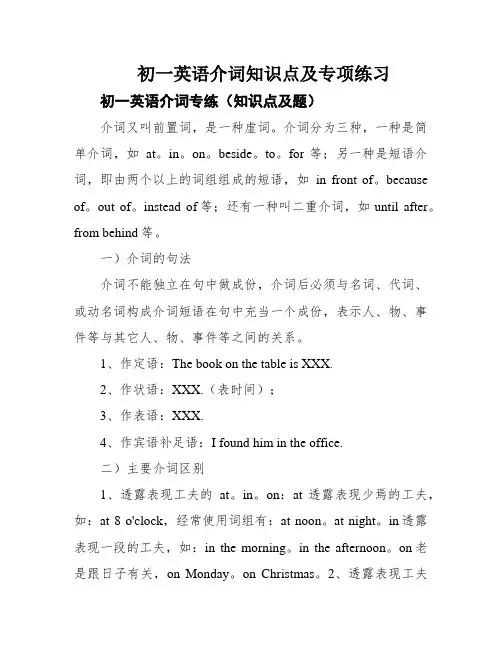
初一英语介词知识点及专项练习初一英语介词专练(知识点及题)介词又叫前置词,是一种虚词。
介词分为三种,一种是简单介词,如at。
in。
on。
beside。
to。
for等;另一种是短语介词,即由两个以上的词组组成的短语,如in front of。
because of。
out of。
instead of等;还有一种叫二重介词,如until after。
from behind等。
一)介词的句法介词不能独立在句中做成份,介词后必须与名词、代词、或动名词构成介词短语在句中充当一个成份,表示人、物、事件等与其它人、物、事件等之间的关系。
1、作定语:The book on the table is XXX.2、作状语:XXX.(表时间);3、作表语:XXX.4、作宾语补足语:I found him in the office.二)主要介词区别1、透露表现工夫的at。
in。
on:at透露表现少焉的工夫,如:at 8 o'clock,经常使用词组有:at noon。
at night。
in透露表现一段的工夫,如:in the morning。
in the afternoon。
on老是跟日子有关,on Monday。
on Christmas。
2、透露表现工夫的since和from:since透露表现从曩昔到目前的一段工夫的进程,常与目前完成时连用。
from透露表现从工夫的某一点入手下手,不触及与目前的干系。
普通多与目前时、曩昔时、未来时连用。
如:XXX from today./ We have not seen each other since 1995.3、表示时间的in和after:两者都表示"在(某个时间)之后,区别在于in表示"在(一段时间)之后",而after则表示"在(某一具体时间点之后)",in短语和将来时态连用,after短语和过去时态或将来时态连用。
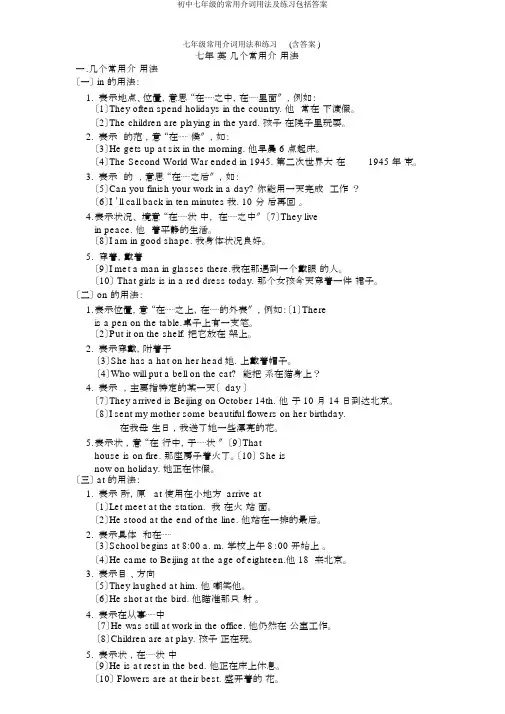
七年级常用介词用法和练习(含答案 )七年英几个常用介用法一.几个常用介用法〔一〕 in 的用法:1.表示地点、位置,意思“在⋯⋯之中,在⋯⋯里面〞,例如:〔1〕They often spend holidays in the country. 他常在下渡假。
〔2〕The children are playing in the yard. 孩子在院子里玩耍。
2.表示的范,意“在⋯⋯候〞,如:〔3〕He gets up at six in the morning. 他早晨 6 点起床。
〔4〕The Second World War ended in 1945. 第二次世界大在1945 年束。
3.表示的,意思“在⋯⋯之后〞,如:〔5〕Can you finish your work in a day? 你能用一天完成工作?〔6〕I ’ll call back in ten minutes我. 10 分后再回。
4.表示状况、境意“在⋯⋯状中,在⋯⋯之中〞〔7〕They livein peace. 他着平静的生活。
〔8〕I am in good shape. 我身体状况良好。
5.穿着,戴着〔9〕I met a man in glasses there.我在那遇到一个戴眼的人。
〔10〕 That girls is in a red dress today. 那个女孩今天穿着一件裙子。
〔二〕 on 的用法:1.表示位置,意“在⋯⋯之上,在⋯⋯的外表〞,例如:〔1〕Thereis a pen on the table.桌子上有一支笔。
〔2〕Put it on the shelf. 把它放在架上。
2.表示穿戴,附着于〔3〕She has a hat on her head她.上戴着帽子。
〔4〕Who will put a bell on the cat? 能把系在猫身上?4.表示,主要指特定的某一天〔 day 〕〔7〕They arrived is Beijing on October 14th. 他于 10 月 14 日到达北京。
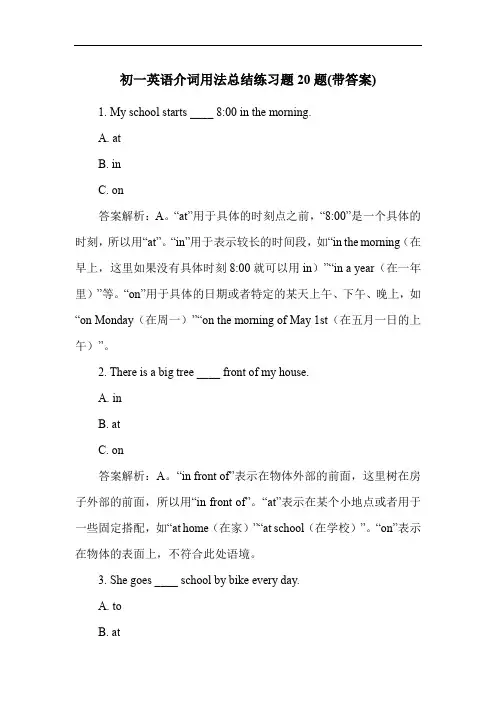
初一英语介词用法总结练习题20题(带答案)1. My school starts ____ 8:00 in the morning.A. atB. inC. on答案解析:A。
“at”用于具体的时刻点之前,“8:00”是一个具体的时刻,所以用“at”。
“in”用于表示较长的时间段,如“in the morning( 在早上,这里如果没有具体时刻8:00就可以用in)”“in a year 在一年里)”等。
“on”用于具体的日期或者特定的某天上午、下午、晚上,如“on Monday 在周一)”“on the morning of May 1st 在五月一日的上午)”。
2. There is a big tree ____ front of my house.A. inB. atC. on答案解析:A。
“in front of”表示在物体外部的前面,这里树在房子外部的前面,所以用“in front of”。
“at”表示在某个小地点或者用于一些固定搭配,如“at home( 在家)”“at school( 在学校)”。
“on”表示在物体的表面上,不符合此处语境。
3. She goes ____ school by bike every day.A. toB. atC. in答案解析:A。
“go to school”是固定搭配,表示去上学,“to”表示方向,指向学校这个目的地。
“at”和“in”不符合这个搭配的用法。
4. My birthday is ____ July.A. inB. onC. at答案解析:A。
“in”用于表示在某个月份,“July( 七月)”是月份,所以用“in”。
“on”用于具体日期,“at”用于具体时刻,都不符合这里的用法。
5. The cat is sleeping ____ the chair.A. underB. inC. on答案解析:A。
“under”表示在物体的下方,猫在椅子下面睡觉,所以用“under”。
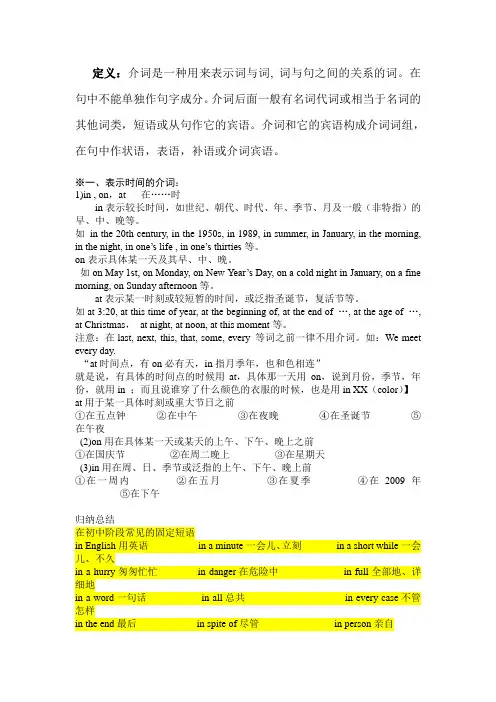
定义:介词是一种用来表示词与词, 词与句之间的关系的词。
在句中不能单独作句字成分。
介词后面一般有名词代词或相当于名词的其他词类,短语或从句作它的宾语。
介词和它的宾语构成介词词组,在句中作状语,表语,补语或介词宾语。
※一、表示时间的介词:1)in , on,at 在……时in表示较长时间,如世纪、朝代、时代、年、季节、月及一般(非特指)的早、中、晚等。
如in the 20th century, in the 1950s, in 1989, in summer, in January, in the morning, in the night, in one’s life , in one’s thirties等。
on表示具体某一天及其早、中、晚。
如on May 1st, on Monday, on New Year’s Day, on a cold night in January, on a fine morning, on Sunday afternoon等。
at表示某一时刻或较短暂的时间,或泛指圣诞节,复活节等。
如at 3:20, at this time of year, at the beginning of, at the end of …, at the age of …, at Christmas,at night, at noon, at this moment等。
注意:在last, next, this, that, some, every 等词之前一律不用介词。
如:We meet every day.“at时间点,有on必有天,in指月季年,也和色相连”就是说,有具体的时间点的时候用at,具体那一天用on,说到月份,季节,年份,就用in ;而且说谁穿了什么颜色的衣服的时候,也是用in XX(color)】at用于某一具体时刻或重大节日之前①在五点钟______②在中午________③在夜晚________④在圣诞节________⑤在午夜_________(2)on用在具体某一天或某天的上午、下午、晚上之前①在国庆节_________②在周二晚上_________③在星期天_________(3)in用在周、日、季节或泛指的上午、下午、晚上前①在一周内_________②在五月_________③在夏季_________④在2009年_________⑤在下午_________归纳总结在初中阶段常见的固定短语in English用英语in a minute一会儿、立刻in a short while一会儿、不久in a hurry匆匆忙忙in danger在危险中in full全部地、详细地in a word一句话in all总共in every case不管怎样in the end最后in spite of尽管in person亲自in fact事实上in good health身体健康的in front of在……前面in some ways在某些方面in common共同的in public当众☆考题再现:---Who was the first man with A(h1n1) flu in mainland China know for sure?---________May 11,2009.A InB OnC ForD Since2、before、afterbefore表示“在某时刻或某件事之前”,after用在时刻或某件事之后。
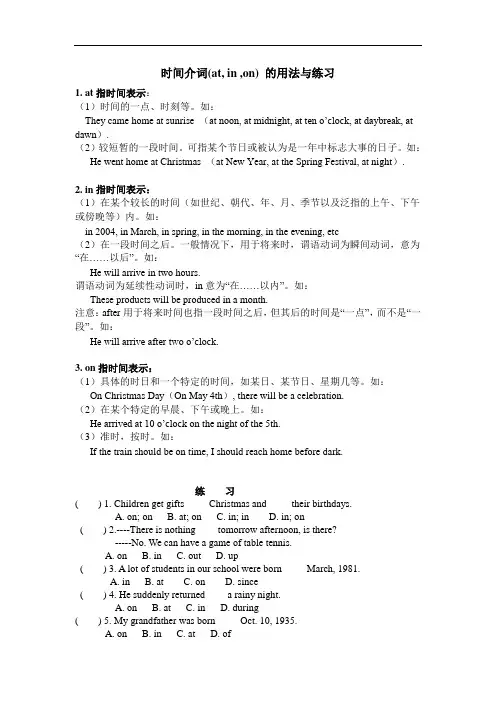
时间介词(at, in ,on) 的用法与练习1. at指时间表示:(1)时间的一点、时刻等。
如:They came home at sunrise (at noon, at midnight, at ten o’clock, at daybreak, at dawn).(2)较短暂的一段时间。
可指某个节日或被认为是一年中标志大事的日子。
如:He went home at Christmas (at New Year, at the Spring Festival, at night).2. in指时间表示:(1)在某个较长的时间(如世纪、朝代、年、月、季节以及泛指的上午、下午或傍晚等)内。
如:in 2004, in March, in spring, in the morning, in the evening, etc(2)在一段时间之后。
一般情况下,用于将来时,谓语动词为瞬间动词,意为“在……以后”。
如:He will arrive in two hours.谓语动词为延续性动词时,in意为“在……以内”。
如:These products will be produced in a month.注意:after用于将来时间也指一段时间之后,但其后的时间是“一点”,而不是“一段”。
如:He will arrive after two o’clock.3. on指时间表示:(1)具体的时日和一个特定的时间,如某日、某节日、星期几等。
如:On Christmas Day(On May 4th), there will be a celebration.(2)在某个特定的早晨、下午或晚上。
如:He arrived at 10 o’cloc k on the night of the 5th.(3)准时,按时。
如:If the train should be on time, I should reach home before dark.练习( ) 1. Children get gifts ____ Christmas and ____ their birthdays.A. on; onB. at; onC. in; inD. in; on( ) 2.----There is nothing ____tomorrow afternoon, is there?-----No. We can have a game of table tennis.A. onB. inC. outD. up( ) 3. A lot of students in our school were born ____ March, 1981.A. inB. atC. onD. since( ) 4. He suddenly returned____ a rainy night.A. onB. atC. inD. during( ) 5. My grandfather was born ____ Oct. 10, 1935.A. onB. inC. atD. of( ) 6. The train is starting ___ five minutes.A. inB. atC. forD. still( ) 7. Mike does his exercises ____ seven _____ the evening.A. on; toB. at; inC. by; ofD. at; on( ) 8. Children wake up very early ____ the morning of Christmas Day.A. inB. onC. forD. at( ) 9 ____ a cold winter morning, I met her in the street.A. InB. OnC. AtD. For( ) 10 It happened to be very cold____ the morning of our sports meeting.A. atB. onC. withD. of( ) 11. Why did you get up so early ___ this morning.A. onB. /C. atD. in( ) 12. He went to Shanghai___ September 3, 1991 and came back___ a cold morning last year.A. in; onB. on; inC. on; onD. in; in( ) 13. Lucy was born____ the night of May 12, 1984. . ...A. onB. inC. atD. to( ) 14. Mrs Brown came to China ____ 1996.A.onB. ofC. to,D. in( ) 15 ___ the morning of November 20, 1915, the workers came to Chicago to show their mourning of Joe Hill.A. OnB. InC. OnD. At( ) 16. Ann moved ___ Hangzhou ___ September, 1992.A. /; inB. to; inC. to; on D, in; in( ) 17. They started off ___ an autumn afternoon.A. duringB. atC. inD. on( ) 18. He often goes ____ school ____ six thirty ____ the morning.A. for; to; inB. to; at; inC. to; for; at D, for; at; to( ) 19. He arrived ___ Shanghai ___ 9: 30 ___ March 5.A. at; in; atB. to; on; atC. in; on; atD. in; at; on( ) 20.The English teacher told me to get there____ half past ten.A: in B. at C. on D. of答案:B A A A A A B B B B BC AD B A D B D B。
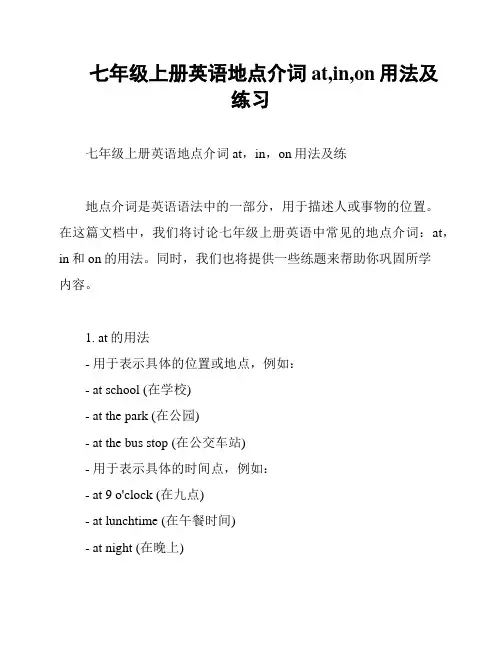
七年级上册英语地点介词at,in,on用法及练习七年级上册英语地点介词at,in,on用法及练地点介词是英语语法中的一部分,用于描述人或事物的位置。
在这篇文档中,我们将讨论七年级上册英语中常见的地点介词:at,in和on的用法。
同时,我们也将提供一些练题来帮助你巩固所学内容。
1. at的用法- 用于表示具体的位置或地点,例如:- at school (在学校)- at the park (在公园)- at the bus stop (在公交车站)- 用于表示具体的时间点,例如:- at 9 o'clock (在九点)- at lunchtime (在午餐时间)- at night (在晚上)2. in的用法- 用于表示大的地点范围,例如:- in Beijing (在北京)- in the park (在公园)- in the classroom (在教室)- 用于表示季节、月份、年代等时间段,例如:- in summer (在夏季)- in October (在十月)- in the 1990s (在上世纪九十年代)3. on的用法- 用于表示具体的表面或平面,例如:- on the desk (在桌子上)- on the wall (在墙上)- on the floor (在地板上)- 用于表示具体的日期或星期几,例如:- on Monday (在星期一)- on June 1st (在六月一日)- on New Year's Day (在元旦)练题:填入适当的地点介词(at, in, on)来完成下列句子:1. I will meet you ___ the library.2. The cat is ___ the table.3. We have a class ___ 9 o'clock.4. They are playing soccer ___ the park.5. The party is ___ Friday night.答案:1. at2. on3. at4. in5. on希望本文对你理解七年级上册英语地点介词的用法有所帮助。
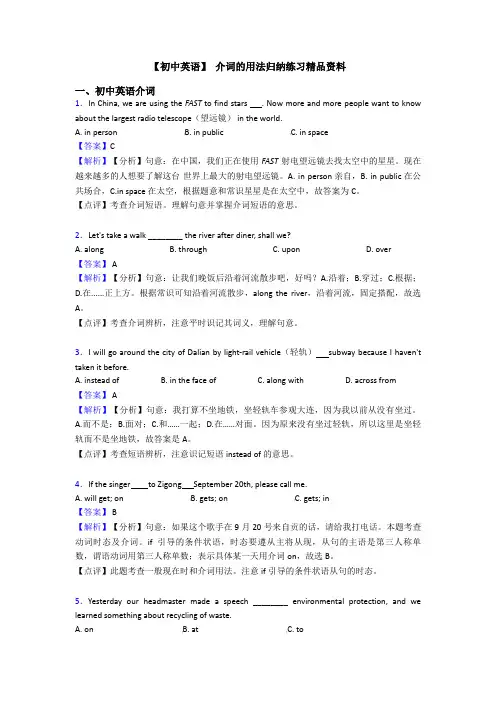
【初中英语】介词的用法归纳练习精品资料一、初中英语介词1.In China, we are using the FAST to find stars . Now more and more people want to know about the largest radio telescope(望远镜) in the world.A. in personB. in publicC. in space【答案】C【解析】【分析】句意:在中国,我们正在使用FAST 射电望远镜去找太空中的星星。
现在越来越多的人想要了解这台世界上最大的射电望远镜。
A. in person亲自,B. in public在公共场合,C.in space 在太空,根据题意和常识星星是在太空中,故答案为C。
【点评】考查介词短语。
理解句意并掌握介词短语的意思。
2.Let's take a walk ________ the river after diner, shall we?A. alongB. throughC. uponD. over【答案】 A【解析】【分析】句意:让我们晚饭后沿着河流散步吧,好吗?A.沿着;B.穿过;C.根据;D.在......正上方。
根据常识可知沿着河流散步,along the river,沿着河流,固定搭配,故选A。
【点评】考查介词辨析,注意平时识记其词义,理解句意。
3.I will go around the city of Dalian by light-rail vehicle(轻轨) subway because I haven't taken it before.A. instead ofB. in the face ofC. along withD. across from【答案】 A【解析】【分析】句意:我打算不坐地铁,坐轻轨车参观大连,因为我以前从没有坐过。
A.而不是;B.面对;C.和……一起;D.在……对面。
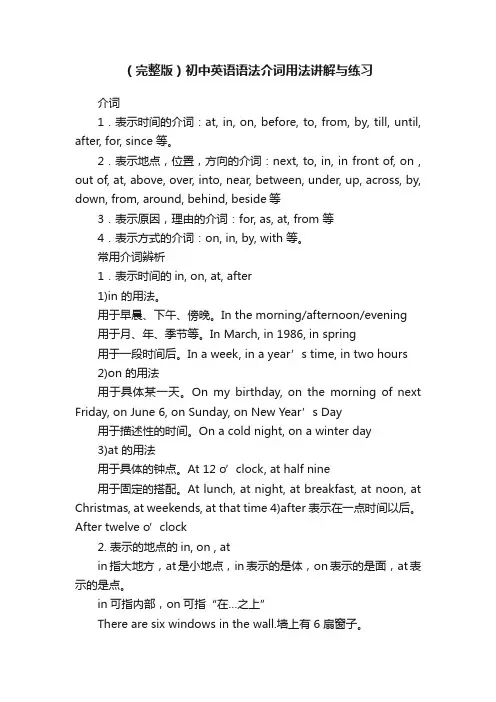
(完整版)初中英语语法介词用法讲解与练习介词1.表示时间的介词:at, in, on, before, to, from, by, till, until, after, for, since 等。
2.表示地点,位置,方向的介词:next, to, in, in front of, on , out of, at, above, over, into, near, between, under, up, across, by, down, from, around, behind, beside等3.表示原因,理由的介词:for, as, at, from 等4.表示方式的介词:on, in, by, with 等。
常用介词辨析1.表示时间的in, on, at, after1)in 的用法。
用于早晨、下午、傍晚。
In the morning/afternoon/evening用于月、年、季节等。
In March, in 1986, in spring用于一段时间后。
In a week, in a year’s time, in two hours2)on 的用法用于具体某一天。
On my birthday, on the morning of next Friday, on June 6, on Sunday, on New Year’s Day用于描述性的时间。
On a cold night, on a winter day3)at 的用法用于具体的钟点。
At 12 o’clock, at half nine用于固定的搭配。
At lunch, at night, at breakfast, at noon, at Christmas, at weekends, at that time 4)after 表示在一点时间以后。
After twelve o’clock2. 表示的地点的in, on , atin指大地方,at是小地点,in表示的是体,on表示的是面,at表示的是点。
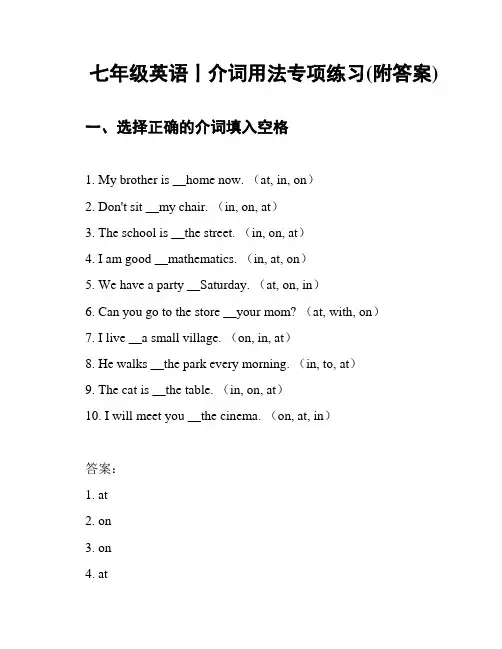
七年级英语丨介词用法专项练习(附答案)一、选择正确的介词填入空格1. My brother is __home now. (at, in, on)2. Don't sit __my chair. (in, on, at)3. The school is __the street. (in, on, at)4. I am good __mathematics. (in, at, on)5. We have a party __Saturday. (at, on, in)6. Can you go to the store __your mom? (at, with, on)7. I live __a small village. (on, in, at)8. He walks __the park every morning. (in, to, at)9. The cat is __the table. (in, on, at)10. I will meet you __the cinema. (on, at, in)答案:1. at2. on3. on4. at5. on6. with7. in8. to9. on10. at二、根据句意,选择合适的介词填入空格1. Please put the books __the desk.2. I live __a big house.3. The supermarket is __the street.4. We have a meeting __Monday morning.5. He is good __playing the guitar.6. The restaurant is __the corner.7. Let's meet __the library.8. The cat is hiding __the sofa.9. They are waiting __the bus stop.10. We will go swimming __the lake.答案:1. on2. in3. across4. on5. at6. around7. at8. under9. at10. at三、按照要求完成句子1. He is waiting at the bus stop.(改为同义句)- He is waiting __the bus stop.2. The book is on the table.(改为同义句)- The book is __top of the table.3. The cat is hiding under the bed.(改为反义疑问句)- The cat is hiding under the bed, __it?4. He went to the park with his friends.(改为选择疑问句)- __ did he go to the park with?5. We go to school by bus.(改为否定句)- We __ __to school by bus.答案:1. at2. on3. isn't4. Who5. don't go。

初中英语介词技巧(很有用)及练习题及解析一、初中英语介词1.—Excuse me, is there a computer room in your school?—Yes. It's ________ the fifth floor.A. onB. inC. atD. to【答案】A【解析】【分析】句意:——打扰了,你们学校有一个电脑室吗?——是的,在五楼。
on 在......上,in在......里,at指向,to指向。
表示在第几楼使用介词on。
故选A。
【点评】考查常用介词的用法。
2.—Is there ________ in today's morning news on CCTV-1?—Yes, France Team beat Korea Team by 4: 0 in the 8`h FIFA Women's World Cup in France ________ June 8, 2019.A. anything special; onB. something special; inC. special something; onD. anything special; in【答案】 A【解析】【分析】句意:——在央视一今日新闻里有特殊的事情吗?——是的。
法国队在2019年6月8日的法国第八届女子足球世界杯中以4:比0的成绩击败了韩国队。
复合不定代词+形容词,排除B、C。
问句是一般疑问句,所以用anything;on+几月几日,June 8 是几月几日,具体日期,所以用on,故选A。
【点评】考查复合不定代词及介词用法,注意平时识记,理解句意。
3.—Excuse me. Where is the nearest bookstore?—Go ________ Center Street and you'll find it.A. ForB. alongC. with【答案】 B【解析】【分析】句意:——打扰一下。
初中英语语法基础介词专题讲解一.介词at/ in /on .1.表示时间:1).表示某一具体时间点,某一时刻/ 年龄at six o’clock at noon at that timeat the moment at the age of at night2)in表示时间段,一天的三个时间段以及月份,年,季节,世纪,人生的某个时期(某人几十岁时)in the morning/afternoon /eveningin spring /in 2007/in Marchin the twenty-first centuryin his fifties3)on表示星期几/某一具体的日子/具体某天的上午/下午/晚上,表示一天中的三个时间段名词前有修饰语或后有修饰语时.On Monday on New Year’s Dayon Sunday morning on a rainy nighton the evening of April 1st ,20072表地点:1)at 一般指较小的地点或较具体的位置at the station at the cinema2)in 表示在较大的地点或一个有限空间里.in China in the classroom3)on 指在某物体的表面上.on the desk注意:写街道时,若有门牌号用at ,否则用on / in 都可.He lives at 270 DongChang’an Street.二.介词in /on / to 表方位:1.in表示A地在B地范围之内.(包含关系)Tanwan is ____ the southeast of China .2.on表示A,B地接壤.(外切关系)Hubei is ____ the north of Hunan .3.to表示A,B两地有一定的间距.(外离关系)Japan is _____ the east of China .三. between / among 在……之间1.between :指两者之间. 在…….之间.2.among :用于三者或三者以上人或物之间. 在……之中.You sit _____ him and me .The song is popular ______ the students.四.after / in 在……之后 before / in 在……之前1. after1)after + 时间段. 表示以过去某一时刻为起点的一段时间之后, 用于过去时.2)after 作介词. after doing sth.2.in +一段时间. 表示说话时或以现在为起点的将来一段时间之后.用于将来时.He came back ______ two days .He will go home___finishing his homework .He will come back _____ two days .3. before 多用于时间点或一件事之前发生,即“先于……;在……之前”He left the office bofore I got there. I’ll be back before five o’clock.4. ago 时间段+ ago 表示“多久之前”时态通常用:一般过去时I met Tom two days ago.五.with / in / by 表示“用……”1.with 表示“用…” 一般指有形的工具/ 手段/ 人体器官.He cut the apple into halves ____ a knife .注: with 表伴随, “带有,含有”He came in _____ a big smile on his face .2.in表示用某种语言,方式,途径. 或书写/绘画所用的材料. 也可表交通方式.Can you say it _____English ?He wrote a letter ____ blue ink .3.by表示乘坐交通工具, 表示方式,方法I study for a test _____ working with a group .He makes a living ____ selling newspapers .注意: 同义词组1).by phone = on the phone2).by car = in a car3).in pen = with a pen = with pens六.across / through / over / by 经过1.across 指横穿,穿过. 表示动作从某一物体表面上经过.2.through 指穿过,透过,表示从某一物体空间内通过.3.over 表示从某人或某物的上空经过或越过,不与表面接触.4.by 表示从某人/某物的旁边经过.Can you swim ______ the river ?the elephant is so big that it can’t go _____ the gate .I don’t think anyone can jump ___ the fenc e.I walked _____ the bank of China yesterday .七.in front of / in the front of1.in the front of 表示在…….内部的前面2.in front of 表示在……外面的前面There is a desk in _____ front of our classroom .There is a big tree in _____ front of our classroom.八.其它介词的用法:1.at的其它用法.1).表示“从事或正在做某事”,其后加的名词往往不加冠词.She is at work now = She is working now .2)at表示“价格或速度”The train ran at 120 kilometers an hour .2.in的其它用法:1)in表示“在……方面”词组:do well in = be good atbe weak in2)in 表示“穿着”后接表颜色的词或衣服.词组: be in +衣服= be wearing +衣服3)in作副词, “在家” = at home3.like 的用法:1).像/和……一样. 常与系动词连用.词组: look like sound like2).与what 连用, “是什么样子, 怎样”.What is he like ? He is kind .4.off的用法:1).从……下来, 脱离某物体.词组: fall off2). “休假”通常放在时间名词之后.词组: have +时间+ offHe has n’t had a night off for two hours .5.except / besides1).except 除了…….之外, 都……. . 不包括在范围之内.注: nothing but … 除了……之外,什么也没有.2).besides除了……之外,还有…… . 包括在范围之内.We all went swimming ______ Lucy .There is _______ a letter in the box .We study Japanese and French____ English .6.with / without1).with具有,含有反义词: without 没有词组: with the help of = with one’s help =because of = thanks towithout one’s help2).without 的用法:A).without + sb./ sth. 没有某人或某物B).without + doing sth . He lef t here without____(say ) “Goodbye”to usC). without sth 常与if 引导的否定的条件句.If there is no water , we can’t live .= We can’t live ______ _______ .7.on the tree /in the treeon the tree 表示“树上本身长的东西” 在树上.in the tree 表示“外界的物体进入树中” 人或物在树上.There are some apples _____ the tree .There is a boy ____ the tree.8.表示“数量的介词”about , round around , over1). about , round around表示“大约……”2).over 表示“超过”= more than.9.inside / outsideInside 在……里面------反义词:outside在….外面10.in the wall /on the wallin the wall 表示“门窗在墙上” on the wall 表示“某东西张贴或挂在墙上”九.不用介词的情况:1).当时间状语为: tonight, today, yesterday, tomorrow 等时,不用介词. What are you going to do tonight ?2).含有this, that, these, those, last, next, every/each day等时间状语.He went to Wuhan last week . I drink milk every day.3).以all 开头的时间状语前面不用介词.He has worked all day .4).以some ,any, one 等构成的时间状语前不用介词.He met a bad man one cold morning. = He met a bad man on a cold morning.介词专题小测:一、单项选择题。
初一英语介词用法总结练习题20题(答案解析)1.I usually go to school ____ seven in the morning.A.atB.onC.in答案解析:A。
at 用于具体的时刻前,seven 是具体的时刻,所以用at。
on 用于具体的某一天或某天的上午、下午、晚上;in 用于泛指的上午、下午、晚上、月份、季节、年份等。
2.My birthday is ____ May 1st.A.atB.onC.in答案解析:B。
on 用于具体的某一天,May 1st 是具体的一天,所以用on。
at 用于具体的时刻前;in 用于泛指的上午、下午、晚上、月份、季节、年份等。
3.We have an English class ____ Wednesday afternoon.A.atB.onC.in答案解析:B。
on 用于具体的某天的上午、下午、晚上,Wednesday afternoon 是具体的某天的下午,所以用on。
at 用于具体的时刻前;in 用于泛指的上午、下午、晚上、月份、季节、年份等。
4.My father often goes to work ____ eight o'clock.A.atB.onC.in答案解析:A。
at 用于具体的时刻前,eight o'clock 是具体的时刻,所以用at。
on 用于具体的某一天或某天的上午、下午、晚上;in 用于泛指的上午、下午、晚上、月份、季节、年份等。
5.The meeting will start ____ three o'clock this afternoon.A.atB.onC.in答案解析:A。
at 用于具体的时刻前,three o'clock this afternoon 是具体的时刻,所以用at。
on 用于具体的某一天或某天的上午、下午、晚上;in 用于泛指的上午、下午、晚上、月份、季节、年份等。
方位介词常用介词in、on、behind、next to、near、over、under等1)(1). in在……里面:It is in the desk.它在课桌里。
(2). on在……上面:It is on the tree.它在树上。
(3). under在……下面/正下方:It is under a basket.他在篮子下面。
(4). over在……正上方:There is a shelf over the table.桌子上方有一个书架。
(5). Between 在……之间It is between two books. 它在两本书之间。
(6). near在……附近:It is near the window. 它在窗户旁。
(7). behind在……之后:It is behind the tree. 它在树的后面。
(8). next to/ beside在……旁边:It is next to/beside an apple. 它挨着苹果。
2)时间或地点介词in、on、at的用法区别:表示时间时, in表示在一段时间里(在将来时句子中则表示在一段时间之后),on表示在具体的某一天或者某天的上下午等,at表示在某个时刻或者瞬间;如:He was born on the morning of May 10th.(他出生于五月十日的早晨)/I usually get up at 7:00 in the morning.(我通常在早上的七点钟起床) /表示地点时, in表示在某个范围之内,on表示在某个平面上或与一个面相接触,at则表示在某个具体的场所或地点。
His glasses are right on his nose.(他的眼镜就架在他的鼻子上)/He is at the cinema at the moment.(此刻他正在电影院)B A B A B AB 在A里——用in A和B相邻(接壤)——用on A和B不相邻(不接壤)——用to3) in front of “在…之前”(范围外)in the front of 表示“在…的前部”(范围内)实战演练1. The United States is ____ the south of Canada and ___ the east of Japan.A. to; inB. on; toC. in; besideD. at; on2 . Japan lies____ the east of China.A. on B/ to C. in D. with3. Jiangsu is___ the east of China, but Japan is ___ the east of China.A. to; inB. in; to .C. on; toD. to; on4. There are some trees_________ the classroomThere is a blackboard ____________ the classroom.A. in front ofB. in the front of5. —Look, there are many apples ______ the tree.—Yes. And a boy is picking apples ______ the tree now.A. in; onB. on; inC. in; inD. on; on6. When did you arrive ______school this morning?A. inB. atC. toD. with。
七年级英语几个常用介词用法归纳一.几个常用介词用法归纳(一)in的用法:1. 表示地点、位置,意思为“在……之中,在……里面”,例如:(1)They often spend holidays in the country. 他们经常在乡下渡假。
(2)The children are playing in the yard. 孩子们在院子里玩耍。
2. 表示时间的范围,意为“在……时候”,如:(3)He gets up at six in the morning. 他早晨6点起床。
(4)The Second World War ended in 1945. 第二次世界大战在1945年结束。
3. 表示时间的经过,意思为“在……之后”,如:(5)Can you finish your work in a day? 你能用一天完成这项工作吗?(6)I’ll call back in ten minutes. 我10分钟后再回电。
4. 表示状况、环境意为“在……状态中,处在……之中”(7)They live in peace. 他们过着平静的生活。
(8)I am in good shape. 我身体状况良好。
5. 穿着,戴着(9)I met a man in glasses there. 我在那遇到一个戴眼镜的人。
(10)That girls is in a red dress today. 那个女孩今天穿着一件红裙子。
(二)on的用法:1. 表示位置,意为“在……之上,在……的表面”,例如:(1)There is a pen on the table. 桌子上有一支笔。
(2)Put it on the shelf. 把它放在书架上。
2. 表示穿戴,附着于(3)She has a hat on her head. 她头上戴着帽子。
(4)Who will put a bell on the cat? 谁能把铃系在猫身上?4. 表示时间,主要指特定的某一天(day )(7)They arrived is Beijing on October 14th. 他们于10月14日到达北京。
词类、句子成分和构词法:1、词类:英语词类分十种:名词、形容词、代词、数词、冠词、动词、副词、介词、连词、感叹词。
1、名词(n.):表示人、事物、地点或抽象概念的名称。
如:boy, morning, bag, ball, class, orange.2、代词(pron.):主要用来代替名词。
如:who, she, you, it .3、形容词(adj..):表示人或事物的性质或特征。
如:good, right, white, orange .4、数词(num.):表示数目或事物的顺序。
如:one, two, three, first, second, third, fourth.5、动词(v.):表示动作或状态。
如:am, is,are,have,see .6、副词(adv.):修饰动词、形容词或其他副词,说明时间、地点、程度等。
如:now, very, here, often, quietly, slowly.7、冠词(art..):用在名词前,帮助说明名词。
如:a, an, the.8、介词(prep.):表示它后面的名词或代词与其他句子成分的关系。
如in, on, from, above, behind.9、连词(conj.):用来连接词、短语或句子。
如and, but, before .10、感叹词(interj..)表示喜、怒、哀、乐等感情。
如:oh, well, hi, hello.2、句子成分:英语句子成分分为七种:主语、谓语、宾语、定语、状语、表语、宾语补足语。
1、主语是句子所要说的人或事物,回答是“谁”或者“什么” 。
通常用名词或代词担任。
如:I'm Miss Green.(我是格林小姐)2、谓语动词说明主语的动作或状态,回答“做(什么)”。
主要由动词担任。
如:Jack cleans the room every day.杰(克每天打扫房间)3、表语在系动词之后,说明主语的身份或特征,回答是“什么”或者“怎么样”。
初一英语介词用法与练习for1. 表示“当作、作为”。
如:I like some bread and milk for breakfast.我喜欢把面包和牛奶作为早餐。
What we have for supper?我们晚餐吃什么?2. 表示理由或原因,意为“因为、由于”。
如:Thank you for helping me with my English.谢谢你帮我学习英语。
Thank you for your last letter. 谢谢你上次的来信。
Thank you for teaching us so well. 感谢你如此尽心地教我们。
3. 表示动作的对象或接受者,意为“给……”、“对…… (而言)”。
如:Let me pick it up for you. 让我为你捡起来。
Watching TV too much is bad for your 看电视太多有害于你的眼睛。
4. 表示时间、距离,意为“计、达”。
如:I usually do the running for an hour in the morning. 我早晨通常跑步一小时。
We will stay there for two days. 我们将在那里逗留两天。
5. 表示去向、目的,意为“向、往、取、买”等。
如:Let’s go for a walk. 我们出去散步吧。
I came here for my schoolbag.我来这儿取书包。
I paid twenty yuan for the dictionary.我花了20元买这本词典。
6. 表示所属关系或用途,意为“为、适于……的”。
如:It’s time for school. 到上学的时间了。
Here is a letter for you. 这儿有你的一封信。
8. 用于一些固定搭配中。
如:Who are you waiting for? 你在等谁?For example, Mr Green is a kind teacher. 比如,格林先生是一位心地善良的老师。
OF1. ...的,属于One of the legs of the table is broken. 桌子的一条腿坏了。
Mr. Brown is a friend of mine.布朗先生是我的朋友。
prep.…的;属于…的the wall of the garden花园的围墙包含的;容纳的a bag of potatoes一袋土豆a kilo of butter一公斤黄油在其中;…之中的一部分several of my friends我的几个朋友at(1)在某具体时刻之前,如at seveno’clock,at7:30。
(2)在固定短语中,如:at noon,at night,at that time,at the age of at the weekend,at Christmas。
表示地点的at的用法区别(1)at通常指小地方,in一般指大地方。
(2)at所指范围不太明确,in指“在……里”。
withtalk with a friend与朋友谈话learn farming with an old peasant 跟老农学习种田prep.和…一起to live with one's parents和父母同住staying with a friend和朋友在一起with her dog带着她的狗inin是介词,后面必须接名词,代词或者动名词,即doing一、表示时间,意为“在…时期, 在…之后, 在过程中”1.in表示年、月、季节、世纪、时代等。
如:in the eighties(在八十年代),in spring(在春季)It often rains here in summer.夏天这里常常下雨。
He was born in 1992.他生于1992年。
【注意】(1)当与morning/evening/afternoon连用时,需与定冠词“the”连用。
如:Don't watch TV too much in the evening.晚上看电视不要太多(2)当表示“在某年代或世纪”时,也必须加定冠词”the“。
如:Great changes took place in the twentieth century.20世纪发生了巨大变化2.介词in + 一段时间,一般用于一般将来时。
如:I’ll come back in five minutes. 我5分钟后就回来(以现在时间为起点,表示从现在起多久以后)We’ll go to school in two weeks. 我们两周后去学校二、表地点、位置、范围、空间,意为“在…里面; 在, 于; 在…部位上”1.In表示地点时,后面一般接大地点,如in London,in BeijingGlasgow is in Scotland. 格拉斯哥在苏格兰2.in 表示空间位置时,表示“在…范围之内”。
The ball is in the box. 球在盒子里Shanghai is in the east of China.上海在中国的东方The jok is in poor state.这个笑话处在尴尬的情况中(言外之意是:这个笑四、表示手段,方法,材料,意为“以…(方式),用…(语言),用……材料”They paid in cash.他们用现金支付They talked in English.他们用英语交谈。
Please write in pencil,not in ink.请用铅笔写,不要用钢笔写。
The letter was written in French.信是用法文写的。
五、表示服饰等,“穿;戴,带着”,要用介词in,如:The policeman is in uniform.警察穿着制服。
She dresses him in his new clothes.她给他穿新衣服。
六、表示“在…(环境)下”,也需用介词in。
如“在阳光下,在灯下,在树阴下,在雨中……”都用介词in搭配。
We walked in the rain.我们冒雨行走They are playing in the shade of a tree.他们坐在树阴下玩耍Don't write in dim light.切勿在暗淡的灯光下写字On介词小测1. Choice (每题2分,共50分)( ) 1 Children get gifts ____ Christmas and ____ their birthdays.A. on; onB. at; onC. in; inD. in; on ( ) 2 -There is nothing ____tomorrow afternoon, is there?-No. We can have a game of table tennis.A. onB. inC. outD. up( ) 3 A lot of students in our schoolwere born____March, 1981. A. in B. at C. on D. since( ) 4The train is starting___five minutes.A. inB. atC. forD. still( ) 5 Mike does his exercises ____ seven _____ the evening. A. on; to B. at; in C. by; of D. at; on( ) 6 We returned to our hometown___.A. next weekB. in the last weekC. last weekD. for a week( ) 7 Children wake up veryearly____the morning of Christmas Day. A. in B. on C. for D. at ( ) 8 Why did you get up so early ___ this morning. A. on B. / C. at D. in( ) 9 Mrs. Brown came to China ____ 1996. A. on B. of C. to, D. in ( ) 10 Annmoved___Hangzhou___September, 1992. A. /; in B. to; in C. to; on D, in; in( ) 11 He often goes ____ school ____ six thirty ____ the morning.A. for; to; inB. to; at inC. to; for; at D, for; at; to( ) 12 He arrived ___ Shanghai ___ 9:30 ___ March 5. fA. at; in; atB. to; on; atC. in; on; atD. in; at; on( ) 13 The doctor worked___ five hours___ a rest.A. for; withB. on; withoutC. about; havingD. for; without( ) 14 We will finish the picture a day. A. in B. on C. after D. on ( ) 15 The teacher is coming back___ an hour. A. after B. for C. in D. before( ) 16 Miss Wang will come toBeijing____ two days. A. after B. in C. on D. before( ) 17 The plane is flying _____.A. in the skyB. in. the airC. in spaceD.in sky( ) 18 Tom sits____the classroom while John sits____the room.A. in front of; at back ofB. in the front of; at the back ofC. in front of; at the back ofD. in the front of; at back of( ) 19 Lucy sits____ the third row,____Jim's left. A. on; on B. in; at C. at; in D. in; on( ) 20 Jiangsu is___ the east of China, but Japan is ___ the east of China.A. to; inB. in; to .C. on; toD. to; on ( ) 21. -Can I look up a word____ your dictionary? -I haven'tgot____me.A. into; aboutB. in; withC. at; inD. on; on( ) 22 1 like mooncakes ____ meat____ them. A. in; on B. with; on C. in; the D. with; in( ) 23 I saw him___hurry at themoment. A. in a B. in C. on D. on a( ) 24 They are getting ready____fly____ England____their holiday. A. for; to; to B. to; to; for C. for; for; to D. to; to; to( ) 25 They are waiting ___ a bus ___ the bus stop. A. for; in B. on; at C. with; at D. for; at2. 选择适当的介词填空。